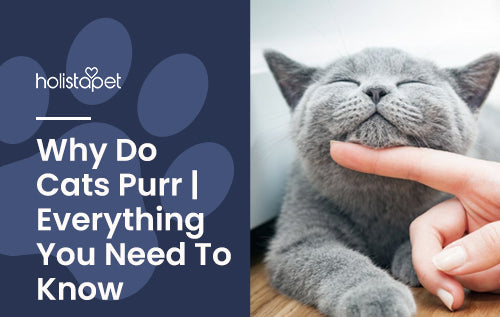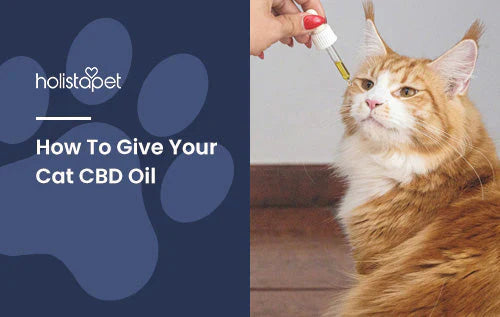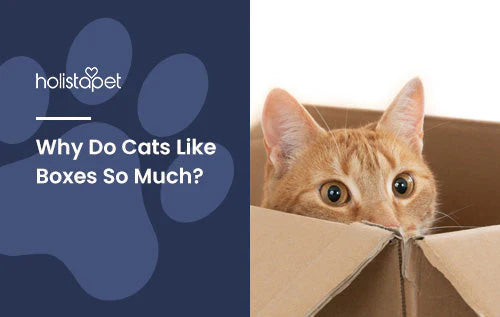When you're cuddling with your kitty you will often hear a soft rumbling sound from their throat. Sometimes you'll even feel them vibrating. That's called a purr, a cat's most common communication tool. But why do cats purr when you pet them? People often associate purring with happiness — head rubs, treats, cuddles. But there are other reasons your fluffy feline might be purring. Read on to learn more about this important cat communication.
Is It Ordinary If My Cat Purrs?
Do cats control their purring? Purring is a very common way that felines communicate! Kittens start purring at a few days old, so it's most definitely a normal means of communication and emotional expression for the feline species. You'll hear — and feel — your cat purring when you pet them! But there are many other reasons cats purr that you may have not been aware of. We'll go over some of those reasons a bit further down.
Can Felines Control Purring?
Why do cats purr a lot? Scientists believe that an area of the cat's brain signals to the voice box muscles (known as the laryngeal muscles) to vibrate — producing the purring sound we all know! Cats are able to control their purring, but it could also be a natural reaction to certain actions or emotions, just like how you automatically laugh when you see something funny or smile when you get a hug from a friend.
What Is Normal Vs. Excessive Purring?
Why does my cat purr when I touch her? All kitties are different. Some might purr a lot while others purr very little. Some felines purr quite loudly while others are almost inaudible at times. Excessive purring is when your cat seems to be purring more than usual. If you notice a change in your cat's behavior and communication — including purring — something might be wrong.
Why Do Cats Purr?
Why do cats purr when you touch them? Even though purring is the most common sound a feline makes, there's surprisingly little research done into this form of feline communication. While there's still more to be learned about purring, here are some reasons cats purr below:
Happiness
When felines are content they will often start purring. This is the most commonly known reason cats purr. You'll notice they start purring when you pet them or when you are cuddling on the bed together. They will purr when they are relaxing on their favorite cat tree or sprawled out in the sun. Cats will also purr when they are asleep as a way to help them de-stress and relax.
Food
When cats purr as newborns it's usually to help their mother find them when it's time to eat. This sometimes carries into adulthood even when they don't live with their mother anymore. When a feline asks for food, there are some kitties that will purr in hopes of inspiring you to feed them. Those purrs will be higher pitched, often accompanied with meows.
Pain
Your cat may be purring in response to pain. It's believed that a purr's vibrations can be physically rejuvenating. The vibration range — 20Hz to 150Hz — is said to promote bone growth. Researchers have found that bones to respond to 25 to 50Hz and skin and soft tissue respond to 100Hz, making purring very therapeutic for a cat dealing with discomfort.
Stress And Fear
Felines will purr when they are being cautious and even when they are startled. A cat may start purring when they are tentatively exploring a new area. They may also purr in response to being chased by a naughty child or hearing a loud noise. Purrs are so powerful, in fact, that a human's blood pressure can go down and they can feel significantly less stressed if they pet a purring cat.
Death
Veterinarians have reported that felines being euthanized will often start purring. Just like when they are afraid or in pain, purring in these scenarios may help them feel comforted even when faced with something traumatizing or unavoidable.

Should I Go To The Vet For A Purring Cat?
Purring is perfectly normal for felines, especially if they are relaxed or getting affection. You should only be concerned if your cat is purring more than usual. This could mean they are stressed or in pain and trying to comfort themselves. If you suspect that your cat is sick or in pain, you should bring them to the vet as soon as possible.
A stressed cat will often show other signs that they are anxious. You may notice diarrhea and vomiting. They may also have a runny nose and eyes. Some cats may start excessively grooming themselves.
Can You Remedy Excessive Purring?
Do you suspect your cat is fearful or stressed? CBD oil and CBD cat treats promote calmness and relaxation in pets, including felines. CBD is a non-psychoactive phytocannabinoid found in hemp, meaning it won't make your cat high! Instead, it reacts with the cannabinoid receptors in your cat's endocannabinoid system (ECS), helping to balance out their mood and emotions.
CBD is a natural way to make your cat feel content and at ease. Try CBD oil for cats on their food each morning or giving them some treats when they appear bothered.
RELATED: Does Neutering a Cat Calm Them Down? Key Behavioral Changes
Keep in mind that purring is not only perfectly natural for felines, but helps relieve their stress. You do not have to be concerned when a feline is purring if you know it's for a good reason!

Final Thoughts
Cats purr for a variety of reasons. From purring in response to cuddles to a purr in reaction to pain and fear, this is an important communication tool for your feline. If you want to better understand your favorite feline, it's definitely important to pay attention to when they purr and why. You'll learn a lot about your feline friend!


 CBD Oil for Cats - Fast Acting
CBD Oil for Cats - Fast Acting
 CBD Cat Treats - Easy Dose
CBD Cat Treats - Easy Dose
 CBD Calming Chews for Cats - Highly Rated
CBD Calming Chews for Cats - Highly Rated
 CBG Oil for Dogs and Cats - Loved by Thousands
CBG Oil for Dogs and Cats - Loved by Thousands





Leave a comment
All comments are moderated before being published.
This site is protected by hCaptcha and the hCaptcha Privacy Policy and Terms of Service apply.